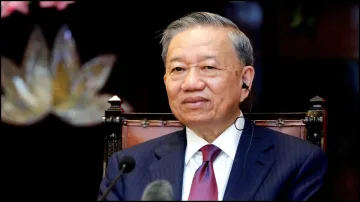Vietnam President To Lam succeeds Nguyen Phu Trong in top job as Communist Party chief
Nguyen Phu Trong, who dominated Vietnamese politics since 2011, passed away two weeks ago at the age of 80. Lam, a career security officer, had been seen as long aiming to become party chief, is believed to be close to Trong and was elected as President in May amid a sweeping anti-graft campaign.

Hanoi: Vietnamese President To Lam was named to the country's top position as the general secretary of the Communist Party of Vietnam on Saturday, succeeding veteran leader Nguyen Phu Trong, who passed away two weeks ago at the age of 80. Lam, 67, had temporarily taken over the duties of party chief on July 18, a day before Trong's death as his health was deteriorating.
Vietnamese officials told a press conference that party delegates unanimously supported Lam's nomination as general secretary, which is the most powerful position in the country. Addressing the delegates, he vowed to inherit and promote Trong's legacy, make no changes to the Southeast Asian nation's foreign policy, focus on achieving its socio-economic development goals and continue Vietnam's anti-graft campaign.
"In the coming time, the work on anti-corruption will be continued fiercely. Personally I feel fortunate that I have much experience in handling anti-graft campaign during the time I worked at the police ministry," Lam said. A career security officer, Lam had been seen as long aiming to become party chief, although it was not clear whether he would keep the two jobs.
Nguyen Phu Trong's legacy
Trong had dominated Vietnamese politics since 2011, when he was elected party chief. During his tenure, he worked to consolidate the Communist Party's power in Vietnam's single-party political system. In the decade before he took the top role in Vietnamese politics, the balance of power had shifted more toward the governmental wing led by then-Prime Minister Nguyen Tan Dung.
Born in 1944 in Hanoi, Trong was a Marxist-Leninist ideologue who earned a degree in philosophy before becoming a member of the Communist Party at the age of 22. He viewed corruption as the single gravest threat to maintaining the party’s legitimacy. “A country without discipline would be chaotic and unstable,” Trong said in 2016 after being reelected to the party’s helm.
The General Secretary of the ruling Communist Party is seen as the most powerful politician in Vietnam. Trong was responsible for a sweeping anti-corruption campaign known as the “blazing furnace” that singed both business and political elites. Since 2016, thousands of party officials have been disciplined, including former presidents Nguyen Xuan Phuc and Vo Van Thuong. In all, eight members of the powerful Politburo were ousted on corruption allegations, compared to none between 1986 and 2016.
Despite differences over sovereignty in the South China Sea, Vietnam maintained its traditional ties with its much larger neighbour China, but also moved closer ties to the United States by elevating its ties to a comprehensive strategic partnership. His anti-graft campaign was seen as eroding institutions within the Communist Party and becoming more like China, where personal power has replaced institutions and rule. His protege President To Lam, who led the anti-corruption campaign, was appointed as the party's caretaker on July 18 when Trong received treatment for his ill-health.
What Lam's appointment as party chief means?
Lam, considered close to Trong, spent over four decades in the Ministry of Public Security before becoming the minister in 2016. As Vietnam's top security official, Lam led Trong's sweeping anti-graft campaign until May. The son of a senior police officer, Lam studied security and obtained a PhD in law.
He was elected president in May after leading the sweeping campaign of high-profile investigations against corruption as police minister. He replaced Vo Van Thuong, who had been in the job for about a year when he quit amid accusations of unspecified wrongdoing. His appointment as party chief comes amid political turbulence due to the anti-graft campaign.
Multiple officials and diplomats said the party had discussed possibly naming a new president so that Lam could focus on the party chief job. If Lam keeps wearing both hats, he may boost his powers and possibly lead the country to a more autocratic style of leadership, officials have said, similar to that of Chinese President Xi Jinping.
This would be a major change for Vietnam, which has engaged in more collective decision-making and subjected leaders to multiple checks, unlike China. However, it is not an unprecedented scenario as Trong held both top jobs for nearly three years until April 2021 after the death of a former president.
(with inputs from agencies)
ALSO READ | PM Modi's BIG message to China on Indo-Pacific, says we support development, not 'expansionism'